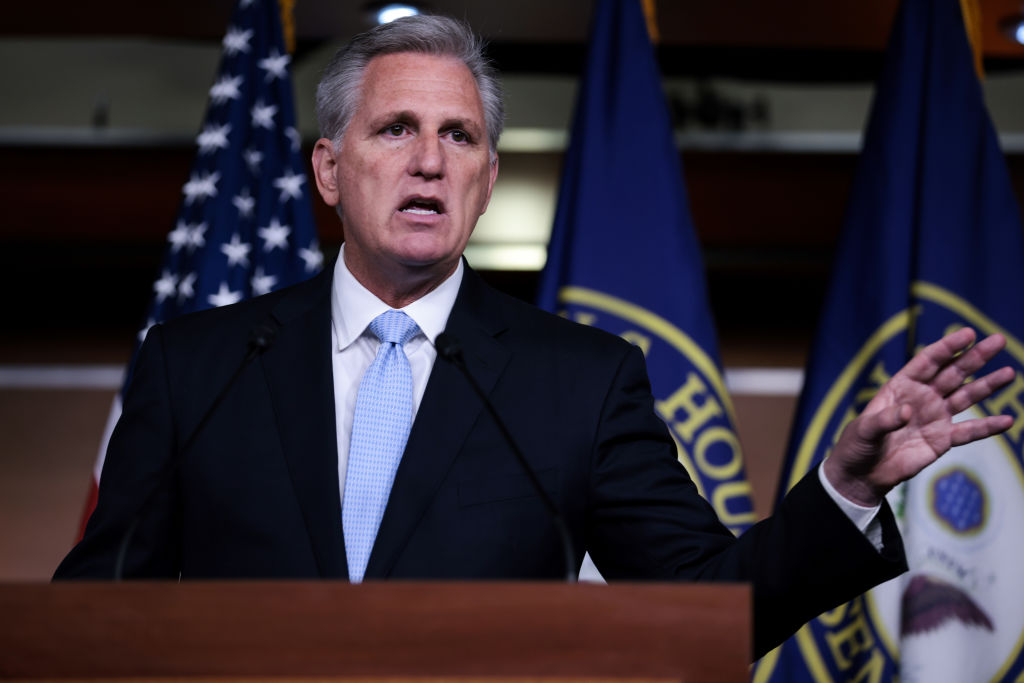House Speaker Kevin McCarthy followed in former President Ronald Reagan’s footsteps on Monday when he traveled to the New York Stock Exchange to deliver remarks concerning the Republicans’ economic plan.
In his first inaugural address in Jan. 1981, Reagan famously said, “In this present crisis, government is not the solution to our problem; government is the problem.”
McCarthy, in essence, said in his remarks to the stock exchange, “In this present crisis, President Joe Biden is the problem.”
Reagan also spoke to the stock exchange in March 1985, just over halfway through his presidency.
The former California governor recounted that when he entered the Oval Office, the nation’s economy was struggling, with double-digit inflation and interest rates, and negative economic growth.
“But in the last five years, we’ve moved from malaise to hope, confidence, and opportunity. We knew that malaise for what it really was: Government, with its high taxes, excessive spending and overregulation, had thrown a wrench in the works of our free markets. In essence, government was trying to run the economy, but was ruining it instead,” Reagan said.
“So, we cut tax rates and counterproductive regulations and moved to limit spending growth.”
The growth in government spending dropped from 10 percent in 1982 to just over 1 percent in 1987 and then went down in 1987 for the first time in over a decade, according to the Reagan Foundation.
[firefly_embed]
[/firefly_embed]
The nation was far worse off economically in 1981 than it is now, and Reagan’s policies were still able to get the nation back on track.
The unemployment rate dropped from 10.8 percent early in his presidency to just over 5 percent when he left office.
Over 18 million jobs were created during his eight years in office, when the nation’s population was nearly 100 million lower than it is today. Inflation dropped from 11.8 percent in January 1981 to under 5 percent in January 1989, and the prime interest rate dropped from 20 percent in January 1981 to 11 percent in January 1989.
McCarthy incorporated Reagan’s line above about government creating economic malaise by throwing a wrench in the works.
“It’s time that government got off its present spending spree before it squanders our future prosperity,” the speaker added, again quoting the 40th president.
“Reagan’s words echo throughout these halls as a warning to all of us today,” McCarthy continued. “We are seeing in real-time the effects of reckless government spending.”
The California Republican argued that Biden’s policies have created the economic headwinds the nation now faces.
“In two short years, President Biden, along with Democrats in Congress, added 6 trillion dollars to our nation’s debt burden – which created inflation, made us more dependent on China, and undermined Medicare and Social Security,” he said.
“Americans have received a pay cut for 24 consecutive months – the longest streak in American history – as inflation has persisted,” McCarthy continued. “In fact, since President Biden took office, families have lost the equivalent of seven thousand four hundred dollars worth of income.”
McCarthy cited the late Nobel Prize-winning economist Milton Friedman — an adviser to Reagan — who said, “inflation is made in Washington.”
The speaker then offered the Republicans’ plan to put the United States back on a sustainable economic path.
It involves the GOP agreeing to raise the nation’s debt ceiling for a year in exchange for three items.
First, keeping federal spending at the 2022 level, minus the money that was spent in response to the pandemic. Further, he would cap future spending over the next decade at 1 percent growth per year.
McCarthy noted that Biden’s “unserious” $6.8 trillion budget proposal for fiscal year 2024, comes in higher than federal government’s spending at the height of the pandemic.
Second, the federal government clawing back tens of billions of unspent dollars appropriated for COVID response.
Finally, the Republicans want to spur economic growth by lowering energy costs through domestic energy production and re-instituting work requirements for those receiving government assistance programs to address the nation’s labor shortage.
“[A]ssistance programs are supposed to be temporary, not permanent. A hand up, not a hand out. A bridge to independence, not a barrier,” McCarthy said.
McCarthy’s plan is really in the spirit of Ronald Reagan, who achieved all he did despite having a Democratic-controlled House the entire time he was in office.
What McCarthy is proposing is reasonable.
Following this path would be good for the economy and country as a whole.
This article appeared originally on The Western Journal.

























 Continue with Google
Continue with Google